Transform Your Space: Expert Landscaping in London
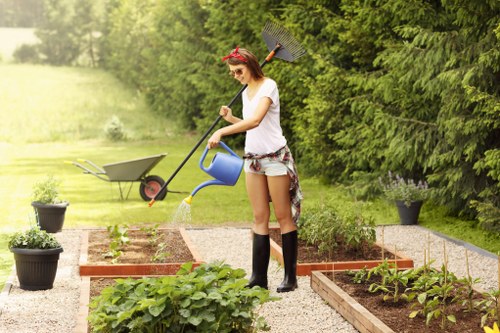
London, a city renowned for its rich history and vibrant culture, also boasts some of the most stunning gardens and outdoor spaces. Whether you're looking to revamp your residential garden or enhance the exterior of your commercial property, landscaping in London offers endless possibilities. With a blend of traditional and contemporary designs, London's landscaping services cater to a diverse range of tastes and preferences.
One of the key aspects of landscaping in London is the integration of sustainable practices. As the city moves towards greener initiatives, landscapers are incorporating eco-friendly materials and native plants to create environments that are both beautiful and sustainable. This not only reduces the environmental footprint but also ensures that your garden thrives with minimal maintenance.
Another trend in London landscaping is the use of vertical gardens and green walls. These innovative solutions maximize space, especially in urban settings where ground space may be limited. Vertical gardens add a touch of greenery to walls and fences, creating a visually appealing backdrop while improving air quality.
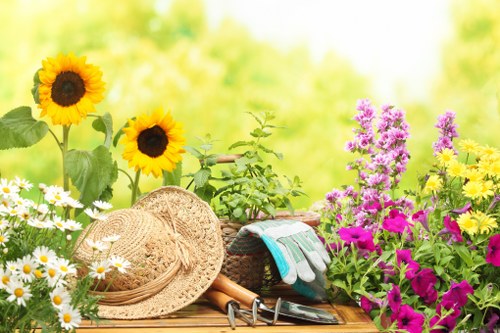
Design and Planning
The initial phase of any successful landscaping project in London involves meticulous design and planning. This phase includes understanding the client's vision, assessing the existing space, and considering factors such as sunlight, soil quality, and drainage. Professional landscapers collaborate closely with clients to develop a comprehensive plan that aligns with their aesthetic preferences and functional needs.
During the planning stage, landscapers may create detailed sketches or 3D models to help clients visualize the final outcome. This ensures that any adjustments can be made early on, saving time and resources. Additionally, landscape architects in London are skilled at blending indoor and outdoor spaces, creating seamless transitions that enhance the overall appeal of the property.
Permits and regulations also play a crucial role in the planning process. London has specific guidelines for certain types of landscaping projects, especially in conservation areas or for listed buildings. Professional landscapers are well-versed in these regulations and ensure that all necessary approvals are obtained before commencing any work.
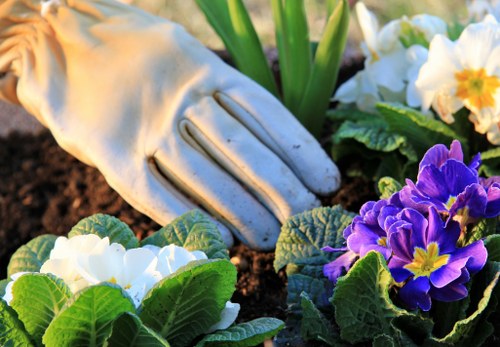
Hardscaping Elements
Hardscaping refers to the non-living elements of landscaping, such as pathways, patios, and retaining walls. In landscaping in London, hardscaping plays a pivotal role in defining the structure and functionality of outdoor spaces. Popular materials include natural stone, brick, and concrete, each offering different textures and aesthetics.
Pathways are essential for guiding visitors through a garden or park, providing both practicality and visual interest. Curved pathways can add a sense of flow and movement, while straight paths offer a more formal and organized feel. Patios and terraces provide areas for relaxation and entertainment, often serving as extensions of the indoor living space.
Retaining walls are not only functional, preventing soil erosion and managing slopes, but they also add a layer of depth and dimension to the landscape. These walls can be designed in various styles, from rustic dry-stone walls to sleek, modern concrete structures, to complement the overall landscaping theme.
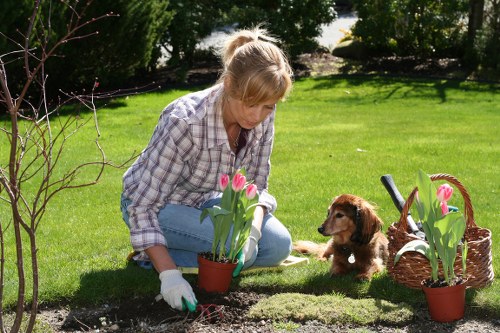
Softscaping Components
Softscaping involves the living elements of a landscape, such as plants, trees, flowers, and grass. In London, the choice of softscaping elements is influenced by the city's diverse climate and seasonal changes. Professional landscapers select plants that are well-suited to the local environment, ensuring resilience and longevity.
Popular choices for London's gardens include perennial flowers, ornamental shrubs, and hardy grasses. These plants not only add color and texture but also attract pollinators like bees and butterflies, contributing to the local ecosystem. Deciduous and evergreen trees are strategically placed to provide shade, privacy, and aesthetic appeal throughout the year.
Seasonal plantings are another important aspect of softscaping. By incorporating a variety of plants that bloom at different times, landscapers ensure that the garden remains vibrant and interesting year-round. This approach also allows homeowners to enjoy a dynamic and ever-changing outdoor space.
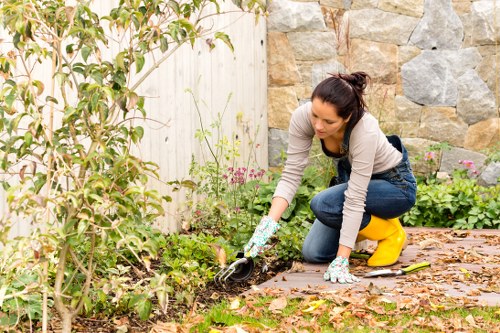
Water Features and Lighting
Incorporating water features such as ponds, fountains, and waterfalls adds a sense of tranquility and elegance to landscaping in London. These elements create soothing sounds and reflections, enhancing the overall ambiance of the garden. Water features can be customized to fit the scale and style of the space, from small decorative ponds to elaborate aquatic installations.
Proper lighting is essential for extending the usability of outdoor spaces into the evening hours. Landscape lighting highlights key features, creates focal points, and ensures safety by illuminating pathways and steps. Energy-efficient LED lights are a popular choice, providing both functionality and aesthetic appeal.
Smart lighting systems offer additional benefits, allowing homeowners to control the intensity and color of lights through automated systems. This enhances the flexibility of the outdoor space, enabling different moods and settings for various occasions.

Maintenance and Care
Maintaining a beautifully landscaped garden requires regular care and attention. Professional landscaping services in London offer comprehensive maintenance plans that include tasks such as pruning, weeding, fertilizing, and pest control. These services ensure that the garden remains healthy, vibrant, and free from unwanted issues.
Seasonal maintenance is particularly important in London's climate. Spring preparations may involve planting new blooms and preparing beds, while autumn tasks include leaf removal and protecting plants from frost. Regular maintenance not only preserves the aesthetic appeal but also prolongs the lifespan of the landscaping investments.
For those who prefer a hands-on approach, many landscapers offer guidance and resources to help homeowners manage their gardens effectively. This includes tips on plant care, irrigation management, and sustainable gardening practices.
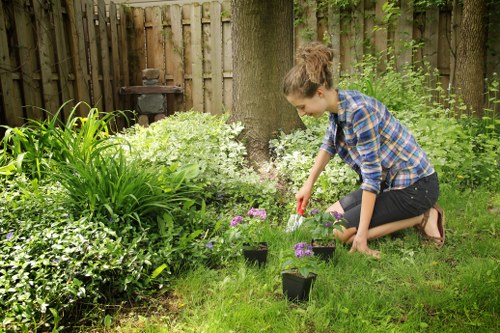
Choosing the Right Landscaping Service
Selecting a reputable landscaping service is crucial for achieving the desired results. In London, there are numerous companies and independent landscapers, each offering a range of services and specialties. It's important to consider factors such as experience, portfolio, customer reviews, and pricing when making a decision.
Reviewing a landscaper's portfolio provides insight into their design style and capabilities. Look for projects that align with your vision and assess the quality of their workmanship. Additionally, reading customer reviews and testimonials can help gauge the reliability and professionalism of the service provider.
Transparent pricing and detailed quotes are also important. A reputable landscaper will provide a clear breakdown of costs, ensuring that there are no hidden fees. It's advisable to request multiple quotes to compare services and prices, allowing you to make an informed decision.
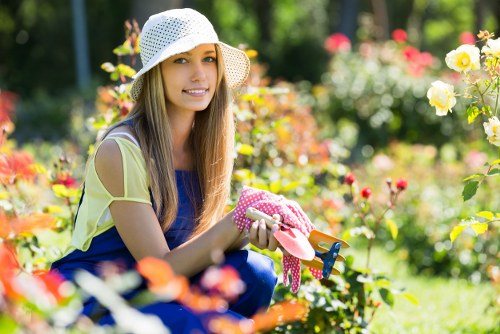
Trends in London Landscaping
Staying updated with the latest trends can elevate your landscaping project and keep your garden looking modern and stylish. Current trends in London landscaping include the use of sustainable materials, minimalist designs, and the integration of technology.
Eco-friendly practices are gaining popularity, with a focus on reducing water usage and utilizing recycled materials. Green roofs and living walls are also on the rise, offering innovative solutions for urban environments. These trends not only enhance the visual appeal but also contribute to environmental conservation.
Minimalist designs emphasize simplicity and functionality, stripping away unnecessary elements to create clean and organized spaces. This approach often incorporates neutral colors, geometric shapes, and a limited color palette, providing a serene and uncluttered environment.
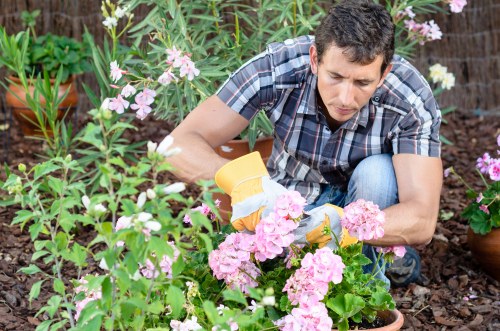
Budgeting for Your Landscaping Project
Creating a beautiful landscape in London doesn't have to break the bank. Proper budgeting is essential to ensure that your project is completed within your financial means. Start by defining your priorities and allocating funds accordingly. Focus on key elements that will have the most significant impact on your outdoor space.
Cost-effective strategies include using native plants, which are typically less expensive and require less maintenance, and opting for DIY projects where possible. Additionally, phased projects allow you to spread out the costs over time, making large-scale landscaping more manageable.
It's also important to account for ongoing maintenance costs. Investing in durable materials and choosing low-maintenance plants can help reduce long-term expenses. Consulting with a professional landscaper can provide valuable insights into cost-saving measures without compromising on quality.
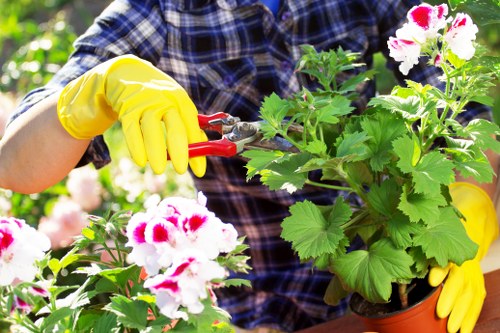
Enhancing Property Value
Investing in landscaping in London can significantly enhance the value of your property. A well-designed garden not only boosts curb appeal but also creates a welcoming atmosphere for potential buyers. Features such as attractive lawns, vibrant flower beds, and functional outdoor spaces can make your property stand out in the competitive London real estate market.
Studies have shown that landscaping can provide a high return on investment, often increasing property values by up to 20%. Beyond financial gains, a beautiful landscape also offers a personal sanctuary, providing a space for relaxation and leisure.
To maximize property value, focus on creating a balanced and cohesive design that complements the architecture of your home. Incorporate features that cater to modern lifestyles, such as outdoor kitchens, fire pits, and seating areas, which add both functionality and aesthetic appeal.
Urban Gardening and Small Spaces
With London being a bustling metropolis, many residents face the challenge of limited outdoor space. Urban gardening solutions, such as rooftop gardens, balcony plants, and compact patios, offer creative ways to incorporate greenery into small areas. These solutions not only enhance the visual appeal but also provide personal green retreats amidst the urban landscape.
Rooftop gardens are an excellent way to utilize unused space, providing a private oasis with panoramic views of the city. They can be designed with a variety of plants, seating areas, and even outdoor dining spaces, creating a multifunctional area for relaxation and entertainment.
Balcony gardening has also gained popularity, with many enthusiasts turning their balconies into lush green spaces. Vertical planters, container gardens, and railing-mounted pots are practical options for maximizing space while maintaining a stylish appearance.
Seasonal Landscaping Tips
Each season brings its own set of challenges and opportunities for landscaping. Adapting your garden to the changing seasons ensures that it remains healthy and attractive throughout the year.
Spring: This is the perfect time to plant new flowers and shrubs. Focus on preparing the soil, planting perennials, and adding vibrant colors to refresh your garden after the winter months.
Summer: Maintain your garden by ensuring adequate watering, mulching, and controlling pests. Consider adding shade elements and mosquito-repelling plants to keep your outdoor spaces comfortable.
Autumn: Prepare for the colder months by cleaning up fallen leaves, trimming dead branches, and planting bulbs for spring. Autumn is also a great time to add seasonal decorations and lighting to enhance your garden's charm.
Winter: Protect your plants from frost by using coverings and mulch. Focus on pruning and planning for the next year's landscaping projects. Winter is an ideal time to enjoy the serene beauty of your garden without the hustle and bustle of other seasons.
Integrating Technology in Landscaping
Modern technology has revolutionized the way we approach landscaping. From automated irrigation systems to smart lighting, technology enhances both the functionality and efficiency of outdoor spaces.
Automated irrigation systems ensure that your plants receive the right amount of water at the right time, reducing water waste and maintaining optimal soil moisture levels. Smart controllers can be programmed to adjust watering schedules based on weather conditions, providing a tailored approach to garden care.
Smart lighting systems offer customizable options for illuminating your garden. These systems can be controlled remotely via mobile devices, allowing you to adjust lighting settings to suit different occasions and times of day.
Additionally, landscape design software and 3D modeling tools enable landscapers to create detailed and accurate representations of proposed projects, facilitating better communication and collaboration with clients.
Eco-Friendly Landscaping Practices
Eco-friendly landscaping, also known as sustainable landscaping, focuses on creating outdoor spaces that are environmentally responsible and resource-efficient. In London, where environmental concerns are paramount, adopting green landscaping practices is both a trend and a necessity.
One key aspect of sustainable landscaping is the use of native plants. These plants are well-adapted to the local climate and soil conditions, requiring less water and maintenance. They also support local wildlife, promoting biodiversity.
Another important practice is water conservation. Implementing rainwater harvesting systems and efficient irrigation techniques helps reduce water usage. Additionally, using permeable paving materials allows rainwater to infiltrate the soil, preventing runoff and reducing the risk of flooding.
Composting and mulching are also integral to eco-friendly landscaping. Compost enriches the soil with essential nutrients, while mulch helps retain moisture, suppress weeds, and improve soil structure.
Enhancing Accessibility in Gardens
Creating an accessible garden ensures that everyone can enjoy outdoor spaces, regardless of physical abilities. In London, inclusive landscaping is increasingly important, especially in public parks and residential areas.
Key features of accessible landscaping include smooth, even pathways, ramps instead of steps, and accessible garden beds. These elements make it easier for individuals with mobility challenges to navigate and enjoy the garden.
Additionally, incorporating sensory elements such as fragrant plants, textured surfaces, and water features can enhance the experience for people with different sensory needs. Thoughtful design fosters a welcoming and inclusive environment for all visitors.
Outdoor Living Spaces
The concept of outdoor living spaces has gained significant traction in London. These areas serve as extensions of the indoor living environment, providing spaces for dining, lounging, and entertainment.
Common features of outdoor living spaces include pergolas, gazebos, and outdoor kitchens. These structures provide shade, shelter, and functional areas for various activities. Comfortable seating arrangements, fire pits, and outdoor heaters enhance the usability of these spaces during colder months.
Integration of multimedia elements, such as outdoor speakers and projectors, allows for a more immersive entertainment experience. Lighting plays a crucial role in setting the mood and ensuring safety, with options ranging from ambient string lights to task lighting around seating areas.
Moreover, the use of durable and weather-resistant materials ensures that outdoor living spaces remain functional and aesthetically pleasing year-round.
Professional vs. DIY Landscaping
When it comes to landscaping, homeowners in London often face the choice between hiring professionals or undertaking DIY projects. Each approach has its own set of advantages and challenges.
Professional Landscaping: Hiring a professional ensures that your garden is designed and maintained by experts with extensive knowledge and experience. Professionals can handle complex projects, provide high-quality workmanship, and save you time and effort. They also offer valuable insights and creative solutions that may not be apparent to DIY enthusiasts.
DIY Landscaping: For those with a passion for gardening and the necessary skills, DIY landscaping can be a rewarding endeavor. It allows for greater creative control and can be more cost-effective. However, DIY projects can be time-consuming and may require a significant investment in tools and materials.
In many cases, a hybrid approach works best. Homeowners can tackle smaller projects themselves while relying on professionals for more complex tasks. This balance allows for personalization without compromising on quality.
Permaculture and Organic Gardening
Permaculture is a sustainable approach to landscaping that emphasizes the integration of natural ecosystems with human activities. In London, permaculture practices are gaining popularity as more people seek to create self-sustaining and resilient gardens.
Key principles of permaculture include diversity, minimal waste, and the use of renewable resources. By mimicking natural processes, permaculture gardens reduce the need for external inputs like fertilizers and pesticides. This not only benefits the environment but also results in healthier and more productive gardens.
Organic gardening is closely related, focusing on growing plants without synthetic chemicals. This approach promotes soil health, encourages beneficial insects, and produces food that is free from harmful residues. Many London gardeners are adopting organic practices to cultivate safe and nutritious gardens.
Integrating permaculture and organic methods can lead to a harmonious and sustainable landscape, enhancing both the beauty and functionality of outdoor spaces.
Conclusion: Elevate Your London Property with Expert Landscaping
Landscaping in London offers a unique opportunity to transform outdoor spaces into beautiful, functional, and sustainable environments. Whether you're enhancing a residential garden or upgrading a commercial property, professional landscaping services provide the expertise and creativity needed to achieve outstanding results.
By incorporating a mix of hardscaping and softscaping elements, integrating sustainable practices, and staying updated with the latest trends, you can create a landscape that reflects your personal style and meets your practical needs. Proper maintenance and thoughtful design ensure that your garden remains vibrant and inviting year-round.
Investing in landscaping not only enhances the aesthetic appeal of your property but also increases its value and provides a serene retreat amidst the urban landscape. Contact us today to begin your journey towards a stunning and sustainable outdoor space in London.
